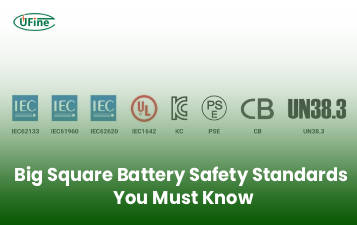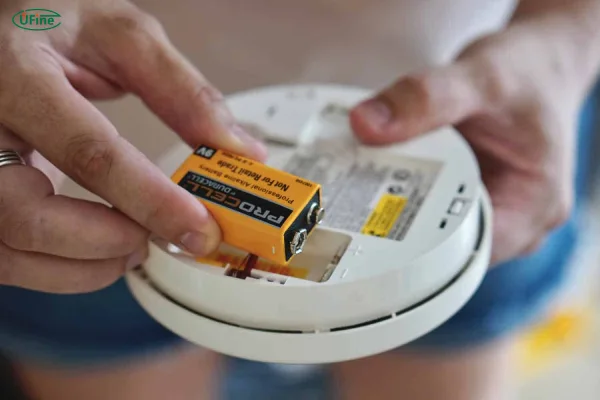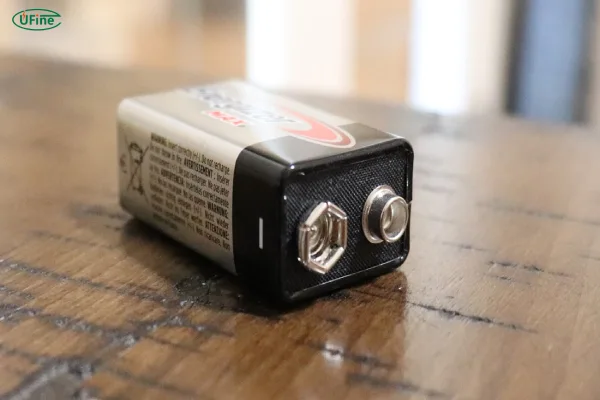
- Part 1. Types of smoke detectors that use 9V batteries
- Part 2. Common types of 9V batteries for smoke detectors
- Part 3. What makes a 9V battery “long-lasting” in smoke detectors?
- Part 4. Best and longest lasting 9V batteries for smoke detectors
- Part 5. Lithium vs. alkaline: which is better for smoke detectors?
- Part 6. Signs it’s time to replace your 9V battery
- Part 7. How often should you replace 9V batteries in smoke detectors?
- Part 8. Tips for maximizing battery life in your smoke detector
- Part 9. How to safely install and dispose of 9V batteries
- Part 10. FAQs
Smoke detectors are critical to home safety—they alert us to danger long before we smell smoke or see flames. But even the most advanced smoke alarm is only as reliable as the battery powering it. In many homes, that power source is a 9V battery.
Choosing the longest lasting 9V battery for smoke detectors isn’t just about convenience. It’s about ensuring your family is protected 24/7 without interruption. In this article, we’ll help you understand what makes a great 9V battery, which ones are best for smoke alarms, and how to make sure you’re getting the longest life and safest performance.
Part 1. Types of smoke detectors that use 9V batteries
Before choosing a battery, it’s important to understand what kind of smoke detector you have. The most common types that rely on 9V batteries include:
Battery-Operated Smoke Detectors
These standalone units are powered entirely by a 9V battery. They’re easy to install but depend fully on the battery to function.
Hardwired Detectors with 9V Backup
These detectors are wired into your home’s electrical system but use a 9V battery as backup in case of a power outage.
Both types require a reliable battery, but in hardwired models, the backup battery can sometimes be overlooked until it fails. That’s why choosing a long-lasting 9V battery is crucial, especially for hard-to-reach detectors.
Part 2. Common types of 9V batteries for smoke detectors
Not all 9V batteries are created equal. The type you choose has a major impact on how long your smoke detector will function before needing a replacement.
Alkaline 9V Batteries
These are the most widely used and budget-friendly option. They typically last 6 to 12 months in smoke detectors.
Lithium 9V Batteries
Longer-lasting and more reliable, lithium batteries can power smoke alarms for up to 10 years. They’re more expensive upfront but save money and hassle over time.
Rechargeable 9V Batteries
Options like NiMH (nickel-metal hydride) are better for frequent-use devices—not ideal for smoke detectors unless specifically approved by the manufacturer.
For smoke detectors, non-rechargeable lithium batteries are usually the best choice for longevity and safety.
Part 3. What makes a 9V battery “long-lasting” in smoke detectors?
Several technical factors contribute to how long a 9V battery will power a smoke detector effectively:
- Capacity (mAh): The higher the capacity, the longer the battery can deliver power.
- Discharge Curve: High-quality batteries provide steady voltage over time, reducing false alarms or sudden failures.
- Shelf Life: How long the battery stays viable before being used. Lithium batteries can last up to 10 years unopened.
- Temperature Tolerance: Smoke detectors are often placed in attics or hallways—batteries need to work well in a range of temperatures.
- Self-Discharge Rate: A low self-discharge rate means the battery loses very little energy when not in use.
Understanding these characteristics can help you choose a battery that performs consistently over many months or even years.
Part 4. Best and longest lasting 9V batteries for smoke detectors
Here are some of the top-rated 9V batteries known for their long life and reliability in smoke detectors:
Energizer Ultimate Lithium 9V
- Lifespan: Up to 10 years
- Pros: Longest lasting, great for extreme temperatures, low self-discharge
- Cons: Higher cost
Duracell CopperTop Alkaline 9V
- Lifespan: 1 year (typical in smoke alarms)
- Pros: Affordable, widely available
- Cons: Needs annual replacement
Panasonic Lithium Power 9V
- Lifespan: Up to 10 years
- Pros: High capacity, long shelf life
- Cons: Not always available in bulk
Tenergy 9V Alkaline
- Lifespan: 6–12 months
- Pros: Budget-friendly, decent performance
- Cons: Shorter life than lithium
Quick Tip: If you want a “set-it-and-forget-it” option, lithium is the way to go. For affordability and regular testing, alkaline will do the job.
Part 5. Lithium vs. alkaline: which is better for smoke detectors?
Lithium Pros:
- Last up to 10x longer than alkaline
- Operate better in hot/cold environments
- Ideal for hard-to-access smoke detectors
Lithium Cons:
- Higher upfront cost
- Some older detectors may not be compatible
Alkaline Pros:
- Budget-friendly
- Good performance for basic needs
Alkaline Cons:
- Require yearly replacement
- May leak if left in too long
Lithium VS. Alkaline Batteries: A Comprehensive Comparison
Verdict: If you value safety and convenience, lithium batteries are the longest lasting and most dependable option for smoke detectors.
Part 6. Signs it’s time to replace your 9V battery
Even the best battery has a finite life. Here’s how to know when your smoke detector’s battery needs replacing:
- Chirping sound every 30–60 seconds
- LED blinking red or turning off
- Failure during test button press
- Detector is 10+ years old (consider replacing the whole unit)
Don’t ignore that chirping—replace the battery immediately or test it to confirm its voltage.
Part 7. How often should you replace 9V batteries in smoke detectors?
This depends on the battery type:
- Alkaline batteries: Replace every 6 to 12 months
- Lithium batteries: Can last up to 10 years (but check monthly)
- Hardwired units: Replace backup battery once a year
Many fire departments recommend changing your smoke detector batteries when daylight saving time begins and ends—a useful, built-in reminder.
Part 8. Tips for maximizing battery life in your smoke detector
To get the longest life out of your 9V battery:
- Install the detector away from kitchens and bathrooms (humidity and steam can trigger false alarms)
- Clean detectors every few months to remove dust
- Use high-quality batteries with known brands
- Check expiration dates before installation
- Never mix old and new batteries
Proper use and maintenance go a long way toward ensuring your battery—and your smoke detector—works when it matters most.
Part 9. How to safely install and dispose of 9V batteries
Installing:
- Open the detector’s battery compartment (usually via a latch)
- Insert the 9V battery with the correct polarity
- Close the lid and press the test button
- Listen for a loud beep (that means it’s working)
Disposing:
- Don’t toss old 9V batteries in the trash
- Use local battery recycling programs
- Tape the terminals before disposal to prevent fire risk
Proper handling protects both your home and the environment.
Part 10. FAQs
How long do 9V batteries last in smoke detectors?
Alkaline batteries typically last 6–12 months, while lithium 9V batteries can last up to 10 years in smoke alarms.
Can I use rechargeable 9V batteries in my smoke detector?
It’s not recommended unless the smoke detector specifically supports rechargeables. Standard lithium or alkaline batteries are more reliable.
Are lithium 9V batteries really worth the cost?
Yes. Though more expensive upfront, they can last 5–10 years and reduce the risk of missed replacements or failures.
Why does my smoke detector chirp even with a new battery?
It could be a loose connection, expired unit, or internal component failure. Try resetting the detector or replacing the unit if it’s older than 10 years.
Do all smoke detectors use 9V batteries?
No. Some use AA batteries or built-in lithium cells. Always check the label or user manual before purchasing replacement batteries.
Related Tags:
More Articles

Big Square Battery Safety Standards You Must Know
Learn key safety standards for big square batteries to avoid fire risks, shipping delays, and compliance issues in EV, industrial, and energy storage projects.
Big Square Battery Applications in Solar & Industrial Equipment
Big square batteries deliver high capacity, stable output, and long life for solar, industrial, and backup power. Explore key uses and advantages.
Big Square Battery vs Cylindrical Battery: Complete 2025 Guide for EVs, ESS & Industrial Devices
Choosing the right battery is key for designers and engineers. Compare big square vs cylindrical batteries to find the best fit for your application.
How to Choose the Right Big Square Battery for Your Device?
If you’re choosing a big square battery for EVs, solar, or mobility devices, this guide helps you pick the right solution for real-world needs.
Big Square Battery Complete Guide: Types, Uses & Buying Tips
If you are choosing a big square lithium battery for EVs, solar, RVs, or AGVs, this guide helps you select the right NMC, LFP, or LTO solution with examples.




